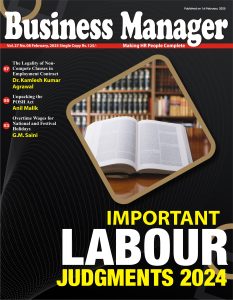The Bombay High Court upheld the punishment of termination of an employee observing that the same is not shockingly disproportionate as he was found guilty of chronic absenteeism.
The court observed thus while dismissing a petition filed by an employee challenging the judgment passed by the Industrial Court, Maharashtra that had refused to interfere with the company’s decision of terminating his services.
A Single Bench of Justice Milind N. Jadhav held, “… services of Petitioner were rightfully terminated by the Respondent – Company and termination of services of Petitioner in the facts of the present case could not be termed as ‘unfair labour practice’. Further grant of one time compensation to Petitioner because he denied backwages is an absolutely erroneous finding which is unsustainable in law and has been rightly set aside by the Industrial Court. The learned Industrial Court has rightly interfered in its revisional jurisdiction with the judgment of the Labour Court and dismissed the Complaint of the Petitioner.”
Advocates Sandeep S. Koregave and Pallavi Karanjkar represented the petitioner.
Factual Background –
The petitioner was employed as a Technical Officer with respondent-company since 1988. He was issued charge-sheet in 2001 for remaining repeatedly and unauthorizedly absent from duty or work without intimation or without leave for a specific period. As per the record, the petitioner remained habitually absent from work without intimation or leave in the year 1998 (for 44.5 days), in the year 1999 (for 63.5 days) and in the year 2000 (for 144 days) and the said fact was mentioned in the charge-sheet issued to him. There was no denying of the fact that he was guilty of chronic absenteeism.
Also read: Haryana’s 75% Quota In Private Sector Scrapped By Court
The petitioner himself admitted the fact that he earned a net income of Rs. 2,50,000/- per year by engaging himself in his milk business during the said period and was thus gainfully employed and in that view of the matter, he had refused back wages. The Labour Court held that in view of refusal of back wages by the petitioner, he would be entitled to lumpsum compensation of Rs. 60,000/- which, prima facie, on the face of record being a perverse finding was dealt with by the Industrial Court accordingly in Revision proceedings, and the judgment of the Labour Court was thus challenged.
The High Court in the above context of the case observed, “… it has come in evidence that Petitioner was guilty of chronic absenteeism, was involved in similar repeated incidents in the past 3 years and despite many oral and written warnings did not improve his conduct. That record of absenteeism of Petitioner from 1998 onwards was duly reflected in the charge-sheet as well as the termination order issued to him by the Respondent – Company. Hence, declaration by the Labour Court that the Company had indulged in unfair labour practice and rewarding the Petitioner with one time lumpsum compensation of Rs.60,000/- could never have been granted to Petitioner in the facts of the present case.”
The Court said that such denial of back wages for the period for which he had not worked cannot be sympathetically held in his favour when he himself had admitted that he was running a milk business and earned Rs. 2,25,000/- per annum therefrom.
“… awarding of lumpsum compensation by the Labour Court was itself illegal and arbitrary. It is seen that case of the Petitioner cannot be categorized as a case of victimization of the Petitioner. It cannot be said to be tainted with any malafides also”, also said the Court.
Accordingly, the High Court dismissed the writ petition and upheld the judgment of the Industrial Court.
Cause Title- Dattaprasad Narayan Kulkarni v. M/s. Auchtel Products Ltd. (Neutral Citation: 2023:BHC-AS:35016)
Stay connected with us on social media platform for instant update click here to join our LinkedIn, Twitter & Facebook



































